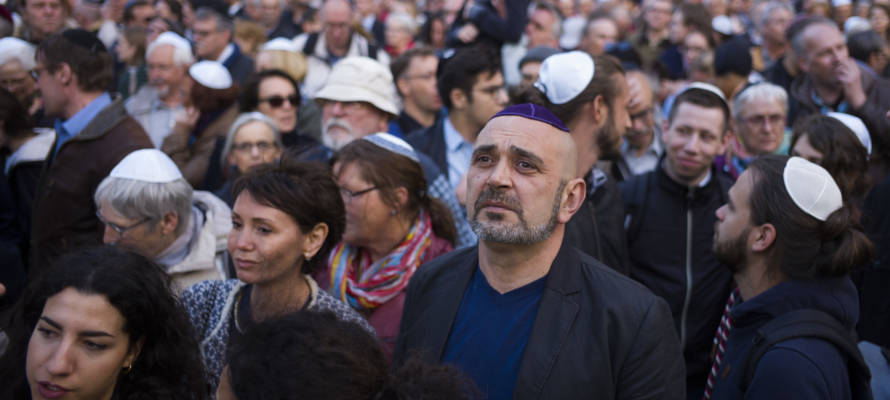Jews and non-Jews, including many politicians, marched in Berlin and other German cities to protest anti-Semitism in the country.
By Beth Stern, United with Israel
Over 2,000 Germans of all faiths protested the rising anti-Semitism in their country on Wednesday by joining a “kippah march” in Berlin and three other cities.
Kippahs are skullcaps worn by religious Jews and are a quick external identifier to thugs from the far right to the far left who are looking to assault Jews, whether verbally or physically. The latest such incident took place last week, when two young men wearing kippahs were attacked by a Syrian asylum seeker on the streets of Berlin, who screamed at them and whipped one with his belt.
The victim filmed his own assault and his post went viral, leading to major German politicians voicing their outrage at the event, including Prime Minister Angela Merkel. But it was Tuesday’s warning by Josef Schuster, head of the Central Council of Jews in Germany, that Jewish men should not wear a kippah in public when walking alone, that inspired the march.
The biggest rally took place in the German capital, where approximately 2,000 people came together, although hundreds also protested in Cologne, Potsdam, Magdeburg and Erfurt. In Berlin, Mayor Michael Muller also donned a kippah, saying it symbolizes “freedom and tolerance.”
“Anti-Semitism has no place in our city,” he stated.
A senior member of Merkel’s party, Volker Kauder, referred obliquely to last week’s attacker in his remarks, referring to the suspect’s wider community – the one million Muslim migrants who now live in Germany. “We do not accept anti-Semitism in our country,” he declared. “Those who come to this country and want to live here must know that too!”
Lapid to Anti-Semites: ‘You Will Fear Us!’
Yesh Atid leader Yair Lapid, in Germany to try and convince the European Union to define Hezbollah as a terrorist organization, joined the march as well.
“It is inconceivable that Jews would be afraid to wear kippot in Germany in 2018,” said the politician, who is the son of a Holocaust survivor. “I will not accept that we and our children are afraid as our parents and grandparents were afraid.” He also stated that the message the demonstrators were giving the anti-Semites was, ‘You will fear us, we will not fear you.”
According to the Kantor Center’s Worldwide Anti-Semitism Report for 2017, 1,435 anti-Semitic crimes were registered in Germany last year, with the number of violent incidents shooting up 60 percent over the previous year. The report also documented the “rising anti-Semitic atmosphere on the ground as well as in cyberspace” that has limited “tremendously” the daily routine of many Jews.
A 2017 study by the German Ministry of the Interior stated that almost one-third of German Jews “have experienced verbal or physical anti-Semitic attacks and were facing increasing anti-Semitism in their everyday lives, which led them to fear for their safety.”
